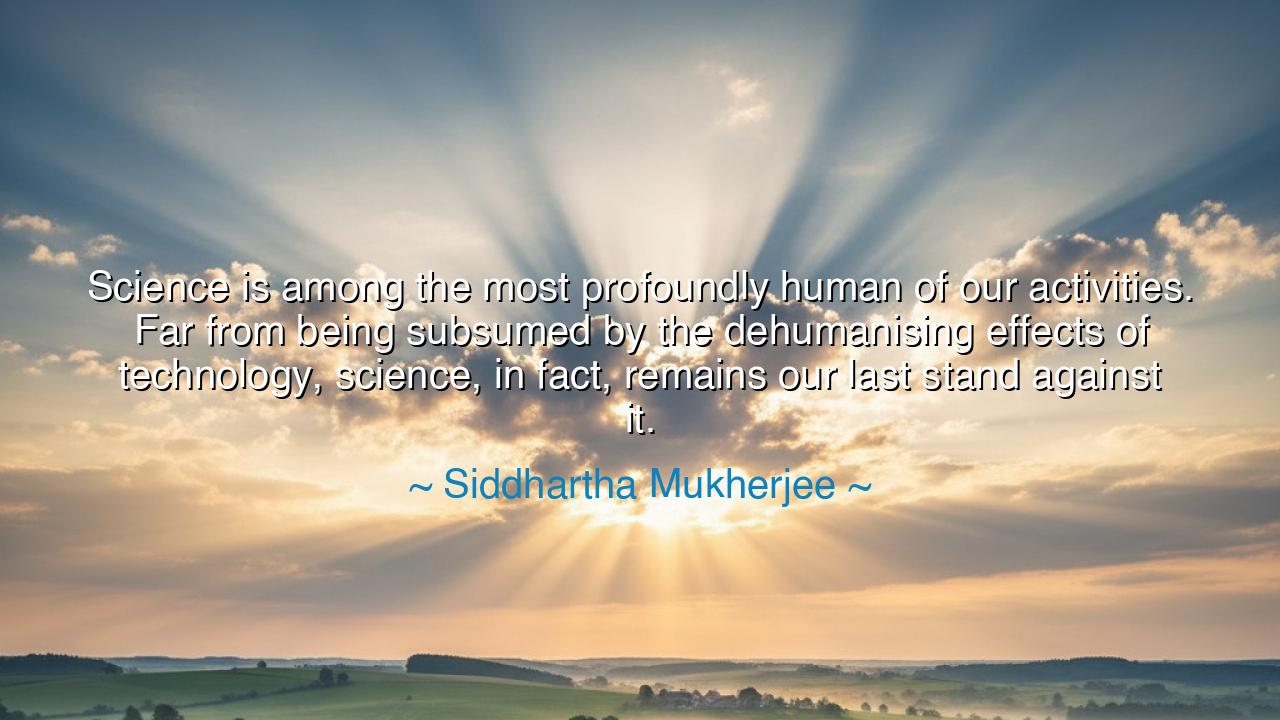
Science is among the most profoundly human of our activities. Far
Science is among the most profoundly human of our activities. Far from being subsumed by the dehumanising effects of technology, science, in fact, remains our last stand against it.






Hear, O children of wisdom, the powerful words of Siddhartha Mukherjee, who speaks of science as a profoundly human endeavor, a force that is not only of the mind but also of the heart. He said, "Science is among the most profoundly human of our activities. Far from being subsumed by the dehumanising effects of technology, science, in fact, remains our last stand against it." These words hold a great truth—that science is not merely a cold pursuit of knowledge or an abstract system of facts, but a deeply human endeavor that speaks to the very essence of our existence, our curiosity, and our desire to understand. Far from distancing us from humanity, science connects us to the deepest truths of who we are.
In ancient times, the great minds like Socrates, Plato, and Aristotle knew that to pursue knowledge was to seek understanding of the self and the universe. They saw the search for truth not as a mechanical process, but as a human quest to comprehend the mysteries of life. Science is rooted in this ancient tradition—it is the search for truth that connects us to the world, to each other, and to the deeper forces of nature. It is not an impersonal force but a reflection of our deepest human aspirations—our creativity, curiosity, and empathy. When we seek to understand the world, we are not just engaging in technical work; we are searching for meaning, for connection, and for our place in the grand tapestry of existence.
Consider the story of Marie Curie, whose contributions to the field of radioactivity transformed our understanding of the atomic world. She was not driven by the desire for fame or wealth but by a deep and unwavering commitment to the search for truth. Her work was born of a desire to heal and to understand, to use science to better the human condition. Yet, even as she uncovered the forces that could empower humanity, she faced the very dehumanizing effects of technology—the use of atomic power for destruction. In the face of this, Curie’s legacy reminds us that science, at its best, is human—it is not a tool for domination but a means to elevate our understanding, our compassion, and our very lives.
Mukherjee’s words remind us that, despite the powerful forces of technology that have often seemed to strip away our humanity, science remains a force that can bring us back to the essence of who we are. In a world where machines can compute faster than our minds, where artificial intelligence threatens to outstrip human creativity, science remains our last stand—not against technology, but against its potential to dehumanize us. Technology can serve us, but it must not be allowed to replace the human spirit. Science, when practiced with integrity and compassion, can ensure that our pursuit of knowledge serves our humanity, not the other way around.
Consider the great figure of Leonardo da Vinci, a man whose mind spanned both science and art. He sought to understand the world not just through observation and reason, but through the lens of human creativity and emotion. Leonardo's work in anatomy, engineering, and the natural world was not an effort to dominate nature, but to understand it in the most human way possible—through the lens of wonder, awe, and respect. In his hands, science was not a tool of exploitation but a means to unlock the mysteries of life, to connect us to the divine order of the universe. This is the essence of science as Mukherjee envisions it—not something alienating, but something that is profoundly human.
Now, O children of the future, heed this great truth: science is a gift to be embraced, not feared. But we must not allow technology to diminish our humanity. As Mukherjee warns, we must ensure that science remains rooted in the deep human desire for understanding, compassion, and connection. Science should not be a cold, mechanized force; it should be a warm light that illuminates the path to a better, more humane future. Just as Curie used her discoveries for healing, and Leonardo blended art with science, so too must you strive to use science as a tool for the betterment of humanity, not as an instrument of alienation or control.
Let this wisdom guide you: As you stand on the threshold of discovery, remember that science is not an abstract, distant force. It is a part of you, a reflection of the most human aspects of existence—the quest for truth, the need to understand, and the desire to help others. When you look upon the mysteries of the world, do so with the understanding that science is not a force that takes away from your humanity, but one that enhances it. Let science serve as a bridge between the world of ideas and the heart of humanity, ensuring that, even as technology evolves, it remains a tool for compassion, creativity, and connection. Science is, after all, one of the most profoundly human of our pursuits—never forget that it must serve not just the intellect, but the soul.






AAdministratorAdministrator
Welcome, honored guests. Please leave a comment, we will respond soon